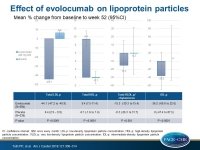PCSK9 inhibitor changes levels and sizes of lipoprotein particles
Evolocumab significantly changes lipoprotein particle number and size, irrespective of concordance with LDL-c at baseline or disease status.
Effect of Evolocumab on Lipoprotein ParticlesLiterature - Toth PP, Sattar N, Blom DJ, et al. - Am J Cardiol 2018;121:308–314
Background
The pro-protein convertase subtilisin/kexin type 9 (PCSK9) inhibitor evolocumab decreases significantly LDL-c levels in various clinical settings, leading to a risk reduction of CV events. The impact on lipoprotein particles or particle subfractions is not clear [1-3].
In this post hoc analysis, the effect of evolocumab on lipoprotein particle concentrations and size was evaluated in the phase 3 DESCARTES (Durable Effect of PCSK9 Antibody Compared with Placebo Study) trial [4]. DESCARTES was a 52-week, randomized, double-blind, placebo-controlled, multicenter, global study of patients with hyperlipidemia. Eligible patients, aged 18-75 years, had LDL-c levels ≥1.9 mmol/L (75 mg/dL) and a fasting triglyceride level ≤4.5 mmol/L (400 mg/dL), despite optimal lipid lowering therapy, and were randomized 1:2 to receive placebo or evolocumab 420 mg monthly.
Lipids and lipoprotein particle analyses, that included LDL, high-density lipoprotein (HDL), very low-density lipoprotein (VLDL)/chylomicrons, and remnant lipoproteins, including small VLDL and intermediate-density lipoprotein (IDL), were assessed by nuclear magnetic resonance (NMR) spectroscopy at baseline and at week 52, in 619 patients with all available data.
Main results
- At baseline, LDL-c was 100.7 mg/dL ± 23.8 (mean ± SD) for the evolocumab group and 99.8 mg/dL ± 21.6 for the placebo group, whereas (LDL particle concentration (LDL-p) was 1100.2 nmol/L ± 286.0 for evolocumab and 1077.1 nmol/L ± 274.5 for the placebo group.
- At week 52, LDL-c level was reduced in the evolocumab group compared with placebo (% change: −53% ± 1.7 vs. 7% ± 1.8, mean ± SE) and HDL-c level was increased (% change: 5.7 ± 0.9 vs. 0.3 ± 0.9). Compared to placebo, evolocumab also reduced levels of triglycerides, apolipoprotein B, and the apoB/A1 ratio, and increased apoA1 levels.
- At week 52, evolocumab compared to placebo reduced total LDL-p (% change: -44.1, 95%CI: -47.2 to -40.9 vs. 6.4, 95%CI: 2.9 to 9.9; P<0.0001), and small LDL-p (-35.4, 95%CI: -56.7 to -11.4 vs. 3.9, 95%CI: -16.9 to 29.0) and large LDL-p (-73.7, 95%CI: -89.9 to -50.9 vs. 5.1, 95%CI: -22.8 to 43.4).
- Evolocumab compared to placebo increased total HDL-p at week 52 (% change: 9.4, 95%CI: 7.5 to 11.4 vs. −0.1, 95%CI: -1.6 to 1.4; P< 0.0001.
- Evolocumab was associated with reductions in the mean total concentration of VLDL-p/chylomicron, medium VLDL-p, small VLDL-p, and IDL-p, and non-significantly increased the concentration of large VLDL-p/chylomicron. All 95%Ci’s were quite wide and included 0.
- The results were consistent in patients with type 2 diabetes, those with metabolic syndrome, and in individuals with impaired fasting glucose and regardless of concordance status of LDL-c/LDL-p levels at baseline (discordance defined as LDL-c and LDL-p values differing by >14 percentile units).
- Size of LDL-p was decreased in the evolocumab group compared to placebo (% change: -1.7 95%CI: -2.0 to -1.4 vs. 0, 95%CI:-0.3 to 0.2, P<0.0001) and the size of HDL and VLDL particles was increased with evolocumab compared to placebo (HDL: 1.1, 95%CI: 0.7 to 1.5 vs. -0.02, 95%CI:-0.4 to 0.4, P<0.001 and VLDL: 8.7, 95%CI:7.0 to 10.5 vs. 0.9, 95%CI:-0.8 to 2.5, P<0.0001, respectively).
Conclusion
Evolocumab significantly changes lipoprotein particle number and size. Treatment with the PCSK9 inhibitor was associated with lower concentrations of total LDL-c, small LDL-p and large LDL-p. These findings may help guide therapeutic decisions in patients with hyperlipidemia.
References
1. Koren MJ, Lundqvist P, Bolognese M, et al, MENDEL-2 Investigators. Anti-PCSK9 monotherapy for hypercholesterolemia: the MENDEL-2 randomized, controlled phase III clinical trial of evolocumab. J Am Coll Cardiol 2014;63:2531–2540.
2. Raal FJ, Honarpour N, Blom DJ, et al. for the TESLA Investigators. Inhibition of PCSK9 with evolocumab in homozygous familial hypercholesterolaemia (TESLA Part B): a randomised, double-blind, placebo-controlled trial. Lancet 2015;385:341–350.
3. Raal FJ, Santos RD, Blom DJ, et al. Mipomersen, an apolipoprotein B synthesis inhibitor, for lowering of LDL cholesterol concentrations in patients with homozygous familial hypercholesterolaemia: a randomised, double-blind, placebo-controlled trial. Lancet 2010;375:998–1006.
4. Blom DJ, Hala T, Bolognese M, et al. for the DESCARTES Investigators. A 52-week placebo-controlled trial of evolocumab in hyperlipidemia. N Engl J Med 2014;370:1809–1819.

